

Dementia Engagement and Empowerment Project. An Admiral Nurse is a Specialist Dementia Nurse. Admiral Nurses provide the specialist dementia support that families need.

Tesco adopts sunflower lanyard to help customers with hidden disabilities. 3 December 2019 Supermarket has signed up to the Valuable 500 to promote disability inclusion From today, Tesco will begin providing sunflower lanyards at all of its stores.

The move is one of several to promote disability inclusion for customers and colleagues in 2020. Tesco has become a signatory to the Valuable 500 group of companies and pledged to create another 27 Changing Places toilets next year. The sunflower lanyard acts as a discreet sign that the wearer has a hidden disability and could require additional assistance.
Also, this month, Tesco has signed up to the Valuable 500, a group of companies and leaders who have committed to putting disability inclusion on their business leadership agenda. Tesco has also announced that it will increase the number of Changing Places toilets in its stores from 49 to 75 in 2020 making it the retailer with the most facilities in the UK. Alessandra Bellini, Tesco Chief Customer Officer said: Dementia Friends. My name is not dementia People with dementia discuss quality of life indicators. Dementia Friends. Prime Minister's challenge on dementia 2012. Living Well With Dementia: a national dementia strategy 2009. Dementia Friends – Bookcase analogy. Dementia UK report. Positive language An Alzheimer's Society guide to talking about dementia. Dementia UK: Short animation. Dementia Cafe Coventry.
Sharing Memories - Coventry Central Library. Arts Gymnasium Living Well. We use cookies to make improvements to our site and advertising.
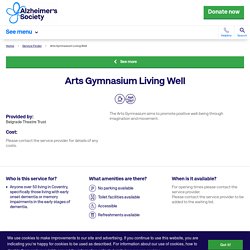
If you continue to use this website, you are indicating you’re happy for cookies to be used as described. For information about our use of cookies, how to disable them and your rights around the information collected visit: how we use cookies. Got it! <iframe src=" height="0" width="0" title="Google Tag Manager">Google Tag Manager</iframe> Dementia Café – information and advice for people in a relaxed setting. ‘The people are so friendly and helpful.
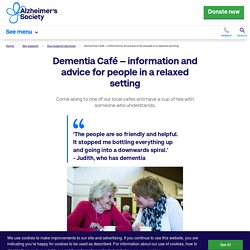
It stopped me bottling everything up and going into a downwards spiral.’ - Judith, who has dementia Come along to one of our local cafes and have a cup of tea with someone who understands. Our highly skilled staff can give you information and help sign post you to other available support services. Perceived barriers to self-management for people with dementia in the early stages. World Health Organisation - Dementia. Dementia is a syndrome – usually of a chronic or progressive nature – in which there is deterioration in cognitive function (i.e. the ability to process thought) beyond what might be expected from normal ageing.
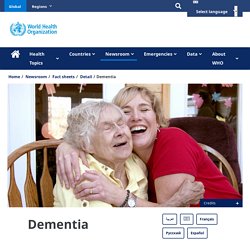
It affects memory, thinking, orientation, comprehension, calculation, learning capacity, language, and judgement. Consciousness is not affected. The impairment in cognitive function is commonly accompanied, and occasionally preceded, by deterioration in emotional control, social behaviour, or motivation. Dementia results from a variety of diseases and injuries that primarily or secondarily affect the brain, such as Alzheimer's disease or stroke. Dementia is one of the major causes of disability and dependency among older people worldwide. About dementia. If you're becoming increasingly forgetful, particularly if you're over the age of 65, it may be a good idea to talk to your GP about the early signs of dementia.
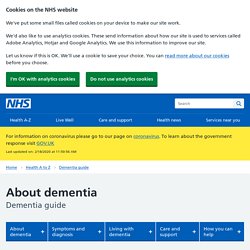
As you get older, you may find that memory loss becomes a problem. It's normal for your memory to be affected by stress, tiredness, or certain illnesses and medications. This can be annoying if it happens occasionally, but if it's affecting your daily life or is worrying you or someone you know, you should seek help from your GP. But dementia isn't just about memory loss. It can also affect the way you speak, think, feel and behave. It's also important to remember that dementia is not a natural part of ageing. What is dementia? - Dementia UK. Dementia is an umbrella term used to describe a range of progressive neurological disorders, that is, conditions affecting the brain.
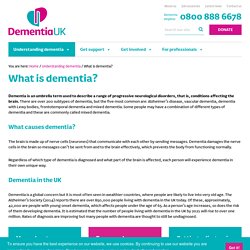
There are over 200 subtypes of dementia, but the five most common are: Alzheimer’s disease, vascular dementia, dementia with Lewy bodies, frontotemporal dementia and mixed dementia. Some people may have a combination of different types of dementia and these are commonly called mixed dementia. What causes dementia? The brain is made up of nerve cells (neurones) that communicate with each other by sending messages. Dementia damages the nerve cells in the brain so messages can’t be sent from and to the brain effectively, which prevents the body from functioning normally. Sudden confusion (delirium) Confusion & Disorientation. A sudden change in a person’s mental state is known as delirium.
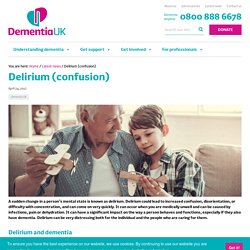
Delirium could lead to increased confusion, disorientation, or difficulty with concentration, and can come on very quickly. It can occur when you are medically unwell and can be caused by infections, pain or dehydration. It can have a significant impact on the way a person behaves and functions, especially if they also have dementia. Delirium can be very distressing both for the individual and the people who are caring for them. NICE Care pathway for Dementia: assessment, management and support for people living with dementia and their carers.
This guideline covers diagnosing and managing dementia (including Alzheimer’s disease).
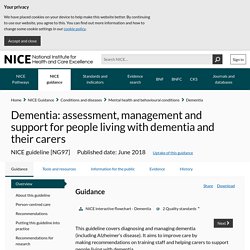
It aims to improve care by making recommendations on training staff and helping carers to support people living with dementia. Your responsibility The recommendations in this guideline represent the view of NICE, arrived at after careful consideration of the evidence available. When exercising their judgement, professionals and practitioners are expected to take this guideline fully into account, alongside the individual needs, preferences and values of their patients or the people using their service. It is not mandatory to apply the recommendations, and the guideline does not override the responsibility to make decisions appropriate to the circumstances of the individual, in consultation with them and their families and carers or guardian. Living With Dementia: A Meta-synthesis of Qualitative Research on the Lived Experience. We use cookies to enhance your experience on our website.By continuing to use our website, you are agreeing to our use of cookies.
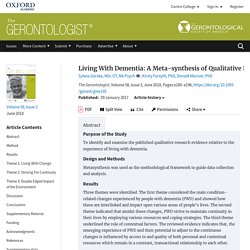
You can change your cookie settings at any time. <a href=" Find out more</a> Skip to Main Content Search Close Advanced Search Search Menu Article Navigation Volume 58 Issue 3. Dementia Diaries: Themes. Dementia Diaries: Some people with dementia speaking/writing about their experiences. Using photo‐elicitation to explore the lived experience of informal caregivers of individuals living with dementia. Background Dementia is defined as the deterioration of cognitive function beyond that which is expected (World Health Organisation, 2017). It is estimated that 850,000 people are living with dementia in the United Kingdom, and this figure is expected to increase to one million by 2025 (Alzheimer's Society, 2014).
Furthermore, it is proposed that the total health and social care costs for dementia almost match the combined costs of cancer, heart disease, and stroke (Alzheimer's Disease International, 2014). Despite the large health care costs associated with dementia care, those living with dementia, and their families, cover two‐thirds of this cost (Alzheimer's Society, 2014). Informal caregiving is defined as unpaid care provided by a relative or friend (Bremer et al., 2015). Method Design This study uses the IPA (Smith, Flowers, & Larkin, 2009) utilizing the method of photo‐elicitation. Participants Six participants took part in this study (aged 53–90 years; two females, four males). Exploring the Lived Experience of People with Dementia Through Interpretative Phenomenological Analysis. Measuring younger onset dementia: What the qualitative literature reveals about the ‘lived experience’ for patients and caregivers.
Dementia Talking Point. Dementia Holidays and Training - Dementia Adventure - Dementia Charity. HOPE PROGRAMME — Hope For The Community CIC. TESTIMONIALS — Hope For The Community CIC.